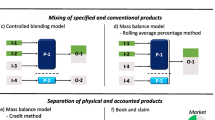
Overview
- For the first time, this book acknowledges spin-off methods and tools built on LCA, namely the “Special Types of Life Cycle Assessment”, and their importance for the growth of LCA
- Part and consequence of the LCA success story is the increasing development of spin-off methods and tools built on LCA, namely the “Special Types of Life Cycle Assessment”
- New approaches, or special types, built on the basis of classical LCA, generated a significant additional momentum to the growth of LCA
- The development of “Special Types of Life Cycle Assessment” opens up new opportunities for a credible and robust use of LCA for real world decision-making in the sense of life cycle management and life cycle sustainability management
Part of the book series: LCA Compendium – The Complete World of Life Cycle Assessment (LCAC)
Access this book
Tax calculation will be finalised at checkout
Other ways to access
About this book
This book presents specialised methods and tools built on classical LCA. In the first book-length overview, their importance for the further growth and application of LCA is demonstrated for some of the most prominent species of this emerging trend: Carbon footprinting; Water footprinting; Eco-efficiency assessment; Resource efficiency assessment; Input-output and hybrid LCA; Material flow analysis; Organizational LCA.
Carbon footprinting was a huge driver for the market expansion of simplified LCA. The discussions led to an ample proliferation of different guidelines and standards including ISO/TS 14067 on Carbon Footprint of Product. Atsushi Inaba (Kogakuin University, Tokyo, Japan) and his eight co-authors provide an up-to-date status of Carbon Footprint of Products. The increasing relevance of Water Footprinting and the diverse methods were the drivers to develop the ISO 14046 as international water footprint standard. Markus Berger (Technische Universität Berlin, Germany), Stephan Pfister (ETH Zurich, Switzerland) and Masaharu Motoshita (Agency of Industrial Science and Technology, Tsukuba, Japan) present a status of water resources and demands from a global and regional perspective. A core part is the discussion and comparison of the different water footprint methods, databases and tools. Peter Saling from BASF SE in Ludwigshafen, Germany, broadens the perspective towards Eco-efficiency Assessment. He describes the BASF-specific type of eco-efficiency analysis plus adaptions like the so-called SEEBALANCE and AgBalance applications. Laura Schneider, Vanessa Bach and Matthias Finkbeiner (Technische Universität Berlin, Germany) address multi-dimensional LCA perspectives in the form of Resource Efficiency Assessment. Research needs and proposed methodological developments for abiotic resource efficiency assessment, and especially for the less developed area of biotic resources, are discussed.The fundamentals ofInput-output and Hybrid LCA are covered by Shinichiro Nakamura (Waseda University, Tokyo, Japan) and Keisuke Nansai (National Institute for Environmental Studies, Tsukuba, Japan). The concepts of environmentally extended IO, different types of hybrid IO-LCA and the waste model are introduced. David Laner and Helmut Rechberger (Vienna University of Technology, Austria) present the basic terms and procedures of Material Flow Analysismethodology. The combination of MFA and LCA is discussed as a promising approach for environmental decision support. Julia Martínez-Blanco (Technische Universität Berlin, Germany; now at Inèdit, Barcelona, Spain), Atsushi Inaba (Kogakuin University, Tokyo, Japan) and Matthias Finkbeiner (Technische Universität Berlin, Germany) introduce a recent development which could develop a new trend, namely the LCA of Organizations.
Similar content being viewed by others
Keywords
Table of contents (8 chapters)
-
Front Matter
-
Back Matter
Reviews
Editors and Affiliations
Bibliographic Information
Book Title: Special Types of Life Cycle Assessment
Editors: Matthias Finkbeiner
Series Title: LCA Compendium – The Complete World of Life Cycle Assessment
DOI: https://doi.org/10.1007/978-94-017-7610-3
Publisher: Springer Dordrecht
eBook Packages: Earth and Environmental Science, Earth and Environmental Science (R0)
Copyright Information: Springer Science+Business Media Dordrecht 2016
Hardcover ISBN: 978-94-017-7608-0Published: 09 August 2016
Softcover ISBN: 978-94-024-1393-9Published: 22 April 2018
eBook ISBN: 978-94-017-7610-3Published: 27 July 2016
Series ISSN: 2214-3505
Series E-ISSN: 2214-3513
Edition Number: 1
Number of Pages: XVI, 399
Number of Illustrations: 50 b/w illustrations, 35 illustrations in colour
Topics: Sustainable Development, Environmental Management, Environmental Engineering/Biotechnology, Industrial Pollution Prevention



